Q & A with Real Organic Project’s Ariel Pressman
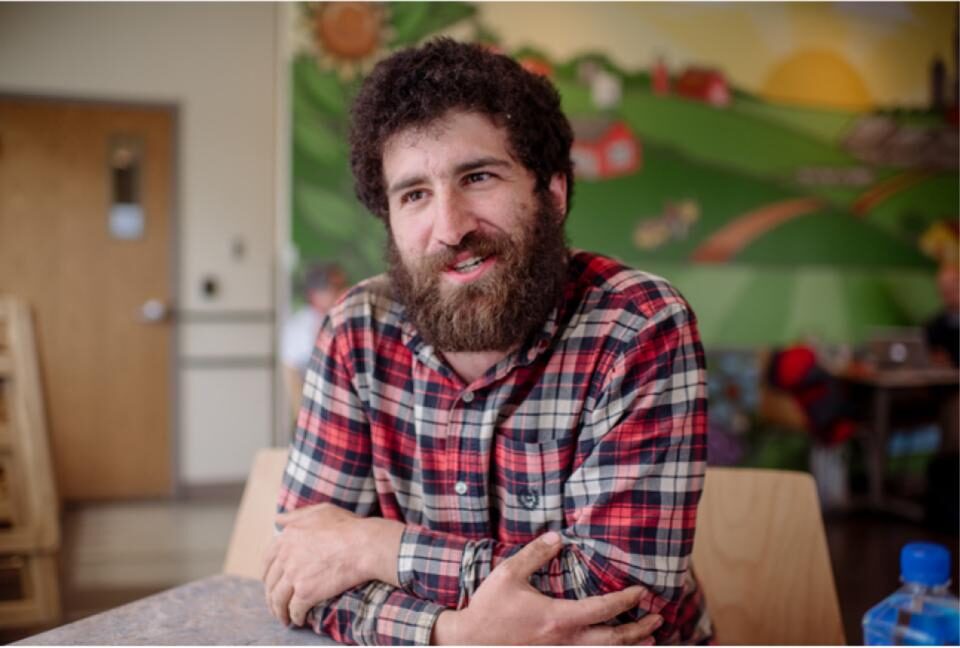
Conscientious eating habits don’t form effortlessly. It takes a little bit of knowledge and perseverance to source your food from farms that are eco- and people-friendly. Third-party certifications like the USDA’s organic label are one tool in the mindful shopper’s chest. But to some, the standards of the USDA seal fall short. Organic and eco-friendly food is a growing industry that agribusinesses are eager to exploit. Pressure on the USDA by some of these industry giants has in some cases led to diluted standards for organic certification. The result is that some of the organic food on the market doesn’t come from sources that match shopper’s expectations when they hear the word “organic.”
That’s where independent organizations like the Real Organic Project come in. ROP offers organic certification for farmers who go above and beyond in their pursuit of food that’s good for the planet and good for the farmer. Their team is composed of organic devotees, some of them former farmers like Lakewinds board member Ariel Pressman. As director of certifications, Ariel guides the standards that ROP-certified farms must meet to attain their seal of approval. We recently sat down with Ariel for a conversation about Real Organic Project’s work and the impact they’re making on the organic industry.
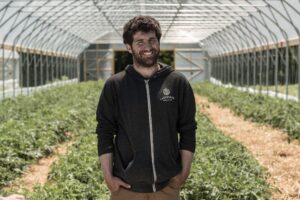
The Need for Real Organic Project
Lakewinds: Tell us about the Real Organic Project and the services you provide.
Ariel: We’re a farmer-led nonprofit and we focus on integrity within the certified organic food system.
What a lot of people might not realize is: You walk into your standard supermarket, co-op, whatever, you assume everything with the USDA seal meets certain common sense standards. The unfortunate reality is that some of it does but some really doesn’t because of the involvement of big business in kind of shaping how those standards are interpreted.
The classic example is that the USDA organic rules state that a certified organic chicken needs to have access to the outdoors. Common sense says that access means that the chicken goes outside: it’s in the sun, it’s on the grass. But a lawyer says access doesn’t actually mean it goes outside, it means it could go outside.
L: What does that look like in practice?
A: So a large farm, packed with chickens, there might be a tiny door that theoretically they could go outside. But they’ve never been outside so they don’t want to go out. And if all of them went outside there sure enough wouldn’t be enough room.
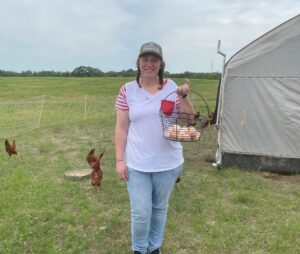
L: What does that mean for farmers and consumers?
A: The downstream effect is that makes the price so low for organic goods that people can’t afford to become a small-scale, pasture-raised organic egg grower because their price would have to be so much higher [than what large-scale farms charge]. They’re effectively put out of business. So you can really see how the egg industry, the dairy industry right now has largely kind of put the small-scale people doing things the right way out of business.
Third-party Verification of Organic Values
“The reality is if you’re being lied to about what you’re buying, you’re just paying extra money.”
L: Why Real Organic? Why should shoppers seek out your stamp, what’s the value?
A: The purpose of Real Organic Project is to provide an add-on certification for farms that raise their animals on healthy living pasture and grow their crops in healthy living soil, the foundational values of the certified organic food system. So all the reasons a consumer’s buying organic, and whether at a co-op or a conventional store, the reason they’re doing it is for their own health and the health of the planet. The reality is if you’re being lied to about what you’re buying, you’re just paying extra money. And unfortunately the USDA seal should be the thing that differentiates products for customers but it really isn’t, which is why there’s the need for an additional, add-on label.
L: So if USDA standards don’t live up to consumer expectations, is there any reason to choose certified organic over conventional?
A: There are many, many farms that are certified organic that deserve that label and meet all the qualities you and I would think a certified farm should. The vast majority of farms that are certified organic absolutely deserve to have that label. Unfortunately the people who don’t are so large that they’re taking up the majority of the shelf space. The very minute number of farms that are doing things the wrong way are on the whole so big that they can really just push out everybody else. I would say that on the whole, if you have the choice between conventional and certified organic you should still buy certified organic. That’s what I do.
How the System is Falling Short
L: What are some examples of the type of shady practices that you see larger organic operations engaging in?
A: One example that a lot of consumers aren’t aware of is a lot of the feed grains that are fed to certified-organic animals … come from other countries where there’s more lax regulations, there isn’t oversight, especially through Turkey and the Ukraine [sic]. It literally leaves [its country of origin] conventional, and then the paperwork magically changes in the middle of the ocean, and now the shipment is worth three times as much and is certified organic. [See this article from Civil Eats reporting on a USDA audit of imported organics for more information.] So you have this system where even on the most basic level, it’s failing, because the grain that bird is being fed isn’t certified organic. To take it one step further, that means a [domestic] real certified organic farm is not being supported by having their grain purchased. We have this crazy thing in this country where we export more of our organic grain that we grow and then we buy most of our organic grain imported. Domestic grain producers cannot compete with the cheap prices coming from abroad.
How to Support Real Organic Practices
L: What can shoppers do to support Real Organic standards at home and at the co-op?
A: We provide the certification completely free for farmers. We don’t want access to be limited just because people are small or because they’re on hard times. So any way consumers can find to support our organization, either through donating to Real Organic Project, attending the Symposium is a great way to do it, that’s one way we raise awareness and get money, and the third way is just to ask for Real Organic products when they go into stores.
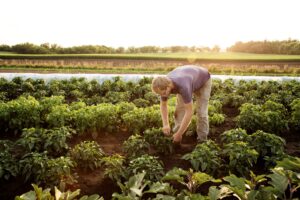
If you can walk in and just know enough to ask, “Hey where did those eggs come from?” that makes a huge difference for retailers. I’m on the board for Lakewinds: If three customers came in and complained about the eggs, I think we’d have a meeting about it. That’s how much places like Lakewinds care about their customers. So you can only imagine what would happen to Whole Foods if 50 people walked in there one day and said, “Hey wait a second, is this milk actually from happy cows?” So I think that’s the biggest, easiest thing that customers can do.
The obvious other thing you can do is, on our website we have a list of all the farms we certify: Just support those farms. Even a co-op, which is out there to do good, can only keep carrying things if they’re selling enough of it to pay for the shelf space. So if people can go in and make a point of buying the products that really support their values, that makes a huge difference.
Shoppers’ Dollars Matter
“Because so few people speak, those who do have an outsized voice.”
L: Do you have any suggestions or advice for how to support Real Organic standards when eating out? Any tips for choosing restaurants or, if you don’t have much choice in the restaurant, any tips that you have for looking at the menu to figure out lower-impact choices?
A: It can be really hard, especially with restaurants. I generally never eat meat when I go out just because I just don’t know the source of it and where it’s coming from. But the other thing you can do is find your favorite farms, find who you love, generally on their websites they’re going to say where they sell their stuff to [such as] Harmony Valley, or Featherstone Farm, or Twin Organics, or Seeds Farm.
And I will say, as someone who used to sell to restaurants a lot, it makes a world of difference. If you go into a restaurant and you say “I’m so glad you’re carrying those Brussels sprouts from Seeds Farm,” it’s outrageous what a big difference that makes in whether they’ll keep carrying your stuff. Oftentimes people don’t realize how much impact their voice can have on these things. Because so few people speak, those who do have an outsized voice.
“Every time you eat you’re making a vote for what food system you want.”
L: That’s extremely helpful for our shoppers and readers, to get that kind of encouragement, that this actually does make a difference. People might feel powerless in the face of industrial agribusiness trends. We like to use the phrase “purchasing power.”
A: I remember hearing Michael Pollan say when I was in college, “Everybody votes three times a day.” Every time you eat you’re making a vote for what food system you want, and I think it’s important to recognize that just because you’re not empowered or have the time or have the money to vote all three times a day to vote the way you want to — we all have to be reasonable with what we can afford, what we have time for — even if you just make one vote a day for the right thing, it makes a huge, huge difference.
An example I give, and I used to fall prey to this all the time: cage-free eggs. Cage-free sounds like a really good phrase, nobody wants a bird in a cage. It also sounds like a phrase that by definition can’t mean anything but what it means, which is there’s no cage. But if you stuff so many chickens in a barn they can’t move anyway you don’t really need a cage.
Don’t Stress, Start Small
“What large agribusiness wants you to do is get overwhelmed so you don’t think about this anymore.”
So I think being more educated about what all this means so when you walk in you know what questions to ask, and you know what pressure points to push, that’s really, really important. Doesn’t mean you need a Ph.D. in this stuff, even just doing 10 minutes of learning, so you understand what some of these words mean and don’t mean, when you’re food shopping will make you a more empowered consumer. We’re just in label-certification-overload world. I’ve seen non-GMO labels on things that can’t possibly be GMO in the first place.
If you feel overwhelmed by all of this, which I’m sure a lot of people do, pick one thing … If you want to make sure your yogurt is sourced right, pay attention to that, your chocolate, your vegetables, whatever. But I think if you can just start with one thing and start paying attention, you’re going to find that it’s a very different shopping experience.
What large agribusiness wants you to do is get overwhelmed so you don’t think about this anymore. Do whatever you have to do for self-care not to get overwhelmed, but don’t think it’s all or zero.
Protecting the Local Food System
“The food system we want and need does not exist by default. It exists because consumers support it and it will by definition cease existing if consumers do not support it anymore.”
L: Do you have any words of warning?
A: The food system we want and need does not exist by default. It exists because consumers support it and it will by definition cease existing if consumers do not support it anymore. It’s really important people realize they’re playing an active role in supporting this. And I think that’s something we realized during the pandemic quite a bit. You saw what empty shelves look like; you saw the importance that local farms play in food security. Something I love that [Lakewinds general manager] Dale told me was that Lakewinds had no shortages of meat products during the pandemic. That food security was provided by the small local farms that are being supported by customers. If Lakewinds had decided to opt out and say “Hey, we’ll just buy whatever’s cheapest on the national market,” we would have been in the same boat as everyone else. That’s number one.
I think number two is that many farms are hanging on by a thread, especially in the meat, milk, and dairy industry. I don’t know if you’ve been following what’s going on with Danone and Horizon [large organic dairy distributers, https://boston.cbslocal.com/2021/08/27/northeast-dairy-farms-losing-market-danone-horizon/]. So essentially how these small dairies work is they have a contract with somebody who buys all their milk, they send the truck, they pick it up. Because you can’t generally sell raw milk to a store and many small farms don’t have the processing facilities. That is the only way to sell your milk: You have a contract, whether that’s with Horizon, Organic Valley, Thousand Hills, whatever. So when a place like Danone drops your farm — which is what they did, they dropped a large number of small holder dairy farms, the exact type of farms that they built their business on, the type of farms that are on the label on the front [of the carton] where it’s like, “Look at us, we support small family farms.” They dropped them like a ton of bricks. What that means for those farms is [that] generational family farms will go out of business. That’s somebody losing their house. That’s somebody losing their livelihood. And that’s losing their generational history of their farm. That’s what large agribusiness does … To my mind, when corporations do that, what they’re doing is they’re putting out a test balloon, to say “Does anyone care that we just did this? Because if they do, we probably won’t do that again. But if they don’t we’re totally going to do this again.” They put out a test balloon to see if consumers care. Do they care about these small dairies? Or do they just want their milk to show up in a happy looking bottle?
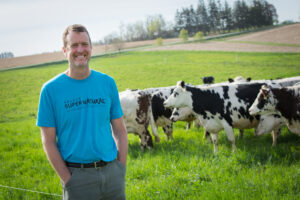
Know Your Farmer (Or Someone Who Does)
L: Any final words?
A: If you’re buying USDA organic products you’re rolling the dice that in my opinion you should not have to as a customer. Most people don’t have the time or ability to visit a farmer. That’s why you’re paying the extra money. So the whole point of having these third parties, whether it’s USDA organic or whether it’s just your co-op like Lakewinds coming out to verify what’s happening, that’s why you’re paying the extra money. I feel very confident when I go to a place like Lakewinds because … somebody there has done the legwork to figure out what’s the best thing to buy. And that’s why I spend extra money and drive 20 minutes to get to Lakewinds because I trust that. The USDA organic label should be the same thing. In a perfect world, we all know our farmers. We all know that’s never going to happen though. So lacking that, you need a place that you can trust.
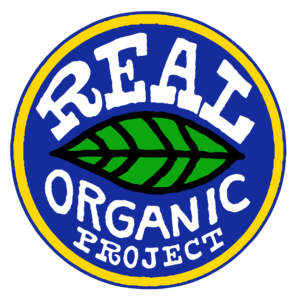
If you’re interested in learning about how Lakewinds is supporting small, organic farms read about the folks who provide our local produce and meat. We also support small, local farmers through our annual Lakewinds Organic Field Fund (LOFF) grants.
Meet your farmers during the Co-op Farm Tour on July 16, 202!
